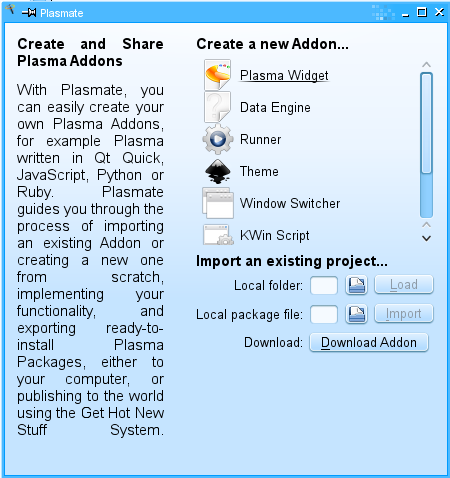Chapter 6. Developing for Plasma Active¶
Contents
6.1. Prologue¶
Plasma Active Apps are easy to create, adapt, publish and distribute. You can use Plasma Quick (which builds on top of Qt Quick and the QML declarative markup language), JavaScript, Python, Ruby, C++ and other languages to write Active Apps. We have collected a set of recommendations for writing apps that get the most out of the platform and provide a native look and feel to the user.
Actual versions can be found on: http://community.kde.org/Plasma/Active/Development.
6.2. Plasma Active Apps entwickeln¶
For developing Plasma Active Apps you can find informations there:
Plasma Active Apps (recommendations and guidelines)
Qt Quick documentation (has everything about Qt Quick)
Afte you have tested your App you can add it to the Buildservice.
6.3. Plasma SDK: Plasmate¶
Add-ons and widgets for Plasma Active can be created without setting up a build system, and without using C++. Plasmate is a small, custom-made IDE specifically taylored for creating Plasma widgets and other add-ons. Plasmate allows you to quickly create new Plasmoids, or 'fork' and improve existing ones.
 |
For using Plasmate you can install it with your package management system. More informations you can see there: http://community.kde.org/Plasma/PlasMate.
6.4. Plasma Active Core Development¶
The project page of Plasma Active with pointers to Git repository, current activity and the likes can be found here. Upstream source code for Plasma Active can be downloaded with
git clone git://anongit.kde.org/plasma-mobile git clone git://anongit.kde.org/contour git clone git://anongit.kde.org/share-like-connect git clone git://anongit.kde.org/plasma-mobile git clone git://anongit.kde.org/plasma-mobile-config
Ergänzend dazu benötigen Sie die frischen “shared-desktop-ontologies”:
git clone git://oscaf.git.sourceforge.net/gitroot/oscaf/shared-desktop-ontologies